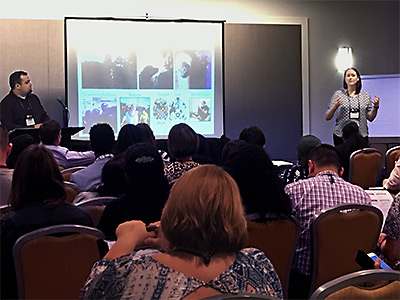
Sione Lavaka, left, and Tara Connolly, right, present their work at a NACADA conference in 2016.
Tara Connolly and Sione Lavaka: Ingenuity in Articles and Presentations
Tara Connolly and Sione Lavaka have originated new theories and practices that will help other American college academic advisors and faculty guide their students.
Connolly is a professional Academic Advisor and International Student Advisor at Truckee Meadows Community College. Sione Lavaka is also a professional Academic Advisor at TMCC, and serves as Pre-professional Advisor as well.
They typically present about twice a year at professional development events and at the National Academic Advising Association (NACADA), now known as The Global Community for Academic Advising. Connolly and Lavaka are currently working on a written piece that is based on their in-person presentations at NACADA concerning the topic name they’ve coined, Double Dose First Gen.
“We did the presentations at regional and national NACADA conferences in Southern California at USC and in Atlanta, Georgia,” Lavaka said.
New and Better Practices
Double Dose First Gen is how Lavaka and Connolly describe students who are both first generation American, and the first generation in their family to go to college. They may live in homes where the first language spoken is not English, or where culture and values are simply different from those families who have been in the U.S. for many generations.
“You also don’t have people in your family who understand the educational system of this country,” Connolly said. “In some countries, students take exams around the time of high school and then are only allowed to pursue certain training or college programs, tracked into specific careers.”
Not knowing the intricacies of the system can be difficult.
“The family may be encouraging you to go to school, but not be able to give you good guidance because the educational systems are so different,” she said. “It can be discouraging to not be guided smoothly into the requirements of the college system.”
There can also be differences in approaches to learning.
“It’s a unique population, a specific group of students that grows up with American culture and beliefs out of the home, but are also managing living with their parents’ culture in the home,” Lavaka said.
One example is that study groups may be more commonplace in America and not as accepted as a routine study practice in other cultures.
“Another example is that Americans as a whole are more individualistic, and other countries may be more collectivistic in their culture,” Lavaka added. “It’s a balance, you have to manage both cultures.”
Lavaka hopes that his work will bring about greater awareness and understanding in the college environment.
“By getting the information out there about the different cultures, it will inform staff here and at other colleges,” he said. “It’s to bring light to the specific populations—and any way we can accommodate unique cultural backgrounds, it will be great for both the staff and the students.”
Hearing an Individual’s Story
Connolly’s goal in her recent work is to help fellow college staff members who hear her presentations at conferences or in professional development workshops to let go of their previous assumptions about first gen students.
“Letting students open up about their story is important,” she said. “We can stop and be truly present with that student and hear their personal story. This is their educational journey and we need to honor that.”
She added that it’s inspiring to learn from other presenters at conferences because new insights may change or add to the focus of her work.
“Presenting and writing with colleagues helps you get to know them on a human level, too, and know more about their own story,” she said. “It increases the respect I have for them and the work that they’re doing.”
Connolly senses that TMCC is becoming widely known for its number and quality of presentations.
“Showing our collaborative writing, and then presenting our work shows that we care about education, we care about our students, and we care about the community,” she said.
Lavaka thinks that it’s not only the students who will benefit from multi-cultural understanding.
“Everyone will benefit—students the most, but also people working in higher education; definitely student services plus academic faculty,” he said.
Coming up in the Accomplished Authors Series
- Perla Petry
- Staci Miller
- Viki Kappel Spain
- Joseph G. Gonzalez
- Chandra Healy
- Chantel Mathson
- Jill Channing
- Jill Barrett
- Mark Maynard
For more information about Academic Advisement, please call 775-673-7062, and for Marketing and Communications, call 775-673-7087.






